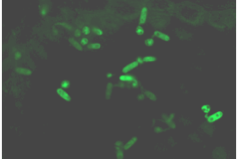
Leaf-fungal endophyte symbioses
by Luis C. Mejía
The intercellular and intracellular spaces within plant tissues have been shown to harbor a highly diverse microcosm of bacteria and fungi collectively known as endophytes. In contrast to pathogens, endophytes establish asymptomatic infections of their hosts, and in some cases have been shown to confer host tolerance to abiotic and biotic stresses. Little is known about the molecular basis of tree endophyte symbioses and the effects these endophytes have in their host physiology and genetic expression.
The main questions to be addressed in this project are: What are the genes or signaling pathways involved in leaf-fungal endophyte symbioses? How do those differ from host pathogen interactions? What are the physiological and molecular mechanisms by which fungal endophytes confer their hosts with tolerance to abiotic and biotic stresses?
The host plant focus of this study is Theobroma cacao, the source of cocoa.
Theobroma cacao represents an ecologically friendly crop for farmers in the tropics, and is the only Neotropical forest tree species which genome is available. Endophytes and pathogens of the genus Colletotrichum as well as Oomycete pathogens of the genus Phytophthora are the symbionts focus of this study. In this project we will implement high-throughput techniques including microarray and transcriptome sequencing analysis to help answer the posed questions.

